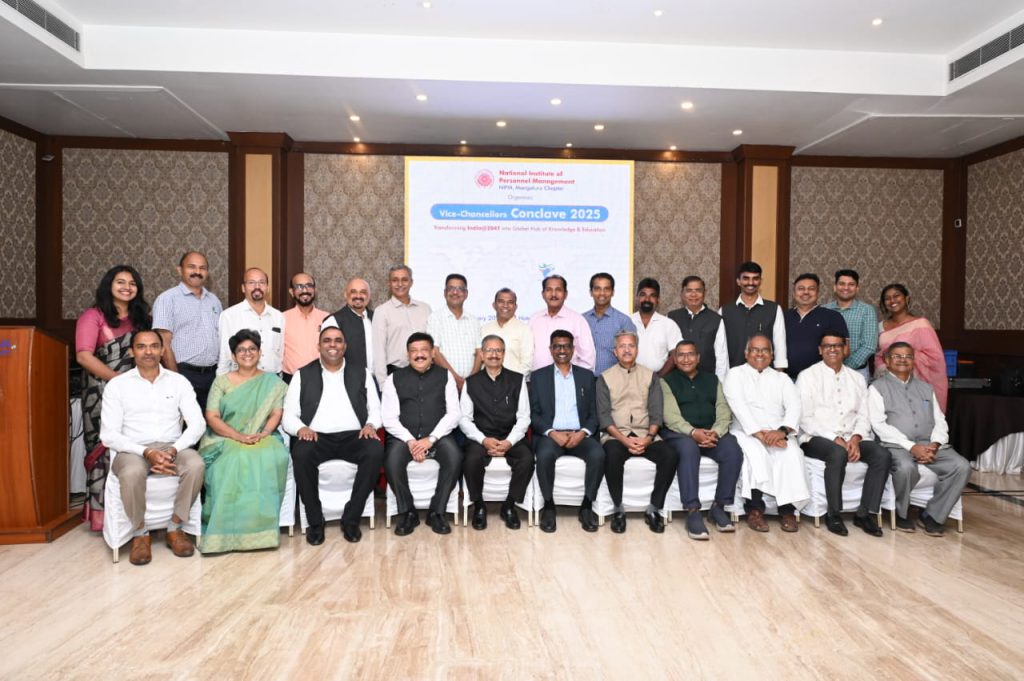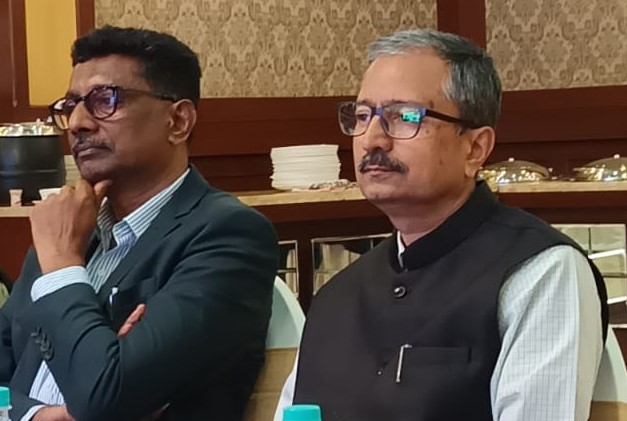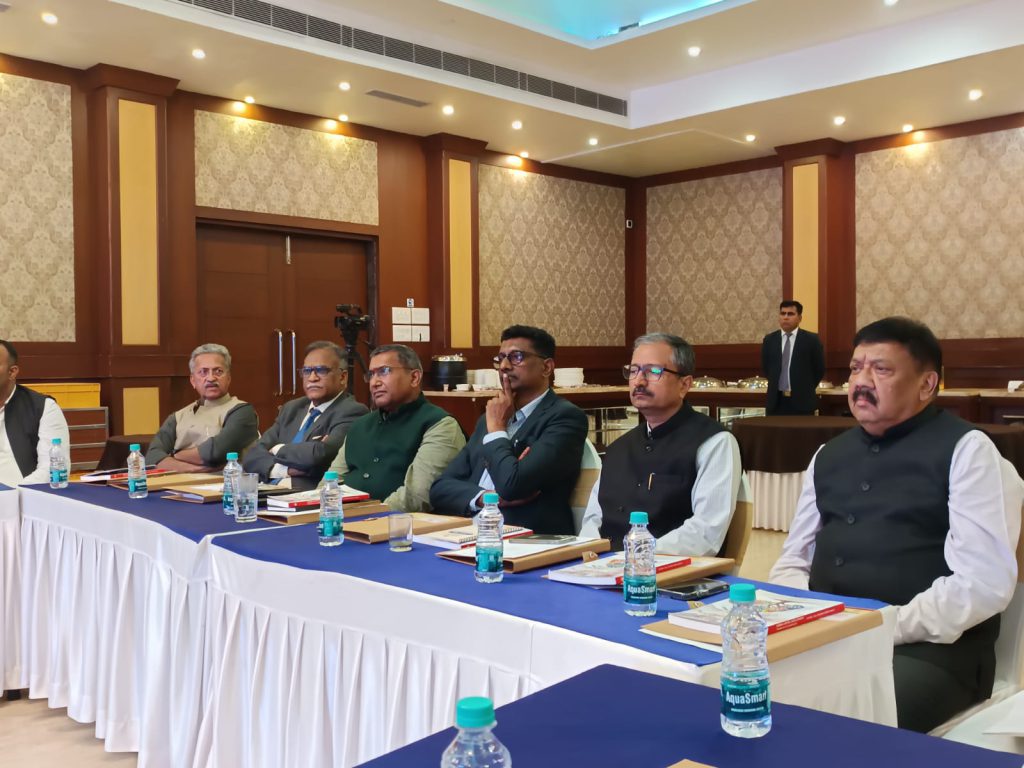Strengthening Regional Collaboration: Dr. Ravi’s Vision for Industry-Academia Partnerships | Revitalizing Engineering Education: Dr. Ravi’s Vision for Industry-Academia Synergy | Global TV
NV Paulose, Chairman, Global TV +91 98441 82044

Prof. B. Ravi, Director, National Institute of Technology Karnataka (NITK) Surathkal highlighted critical challenges and proposed strategic initiatives to enhance India’s engineering education and industry collaboration. He was addressing the Vice Chancellors Conclave (VCC 2025) at Hotel Ocean Pearl, Mangalore Organised by NIPM Mangalore Chapter.
Decline in Core Sector Engagement
Dr. Ravi expressed concern over the dwindling interest among students in core engineering disciplines such as Mechanical, Chemical, and Civil Engineering. He noted a prevailing trend where graduates from these fields often transition into IT roles at companies like Infosys and TCS. Simultaneously, he pointed out that even Computer Science and IT professionals face job security threats due to the rise of AI-driven coding, with companies like Google automating a significant portion of their coding tasks.
Bridging Academia and Industry

Emphasizing the need for a symbiotic relationship between academia and industry, Dr. Ravi identified a critical gap: while faculty excel in theoretical research and patent filings, there’s a noticeable shortfall in translating prototypes into market-ready products. He attributed this to a lack of practical training among faculty and a reluctance from industries to invest in unproven academic concepts. To address this, he presented a pathway from problem identification to concept development, prototyping, incubation, and eventual commercialization.
Holistic Development of Stakeholders
Dr. Ravi outlined a comprehensive strategy targeting various stakeholders:
- Faculty: Encouraged to break departmental silos and engage in interdisciplinary, inter-institutional, and international collaborations.
- Students: Focus on enhancing not just academic knowledge but also physical, mental, and emotional well-being. He stressed the importance of hands-on skills and professional competencies, including effective communication.
- Alumni: Urged to reconnect with NITK, offering their expertise and resources to foster consultancy, shared facilities, and collaborative projects.
- Industry Partners: Proposed the “Four C’s” framework; Continuing Education, Consultancy, Consortium Projects, and Co-located Facilities, to strengthen industry-academia ties.
- Non-Teaching Staff: Advocated for improved work environments, satisfaction, and training opportunities.
- Campus Residents: Envisioned transforming the campus into a smart, sustainable living lab, serving as a model for research and innovation.
Curriculum Reformation
Reflecting on feedback from alumni, Dr. Ravi highlighted that only about 20% of their professional success is attributed to in-classroom theoretical teaching. In response, he proposed a balanced curriculum comprising 50% theory and 50% practical application. The practical component would encompass science and engineering labs, as well as activities fostering physical, cultural, technical, and professional skills. Additionally, he suggested tailored pathways for students aiming for careers in research, industry, or entrepreneurship.
Collaborative Regional Growth
Dr. Ravi emphasized the unique opportunity presented by the Mangalore region, home to numerous engineering and medical institutions. He proposed the formation of a regional institutional coalition, tentatively named “Vibrant Regional Institutional Coalition for Harmonious Growth” (V-RICH), to harness collective strengths and drive harmonious development.
Silicon Beach program to attract companies to come to Mangalore

He also supported initiatives like the “Silicon Beach” program, aiming to attract companies to establish a presence in the area, thereby retaining local talent and fostering economic growth. Dr. Ravi reaffirmed NITK’s commitment to partnering with various stakeholders. Industry, academia and the society at large should collectively progress from good to great; he said.
The importance of taking society into confidence is highlighted in his talk. He called for regular collaborative meetings among institutional leaders to brainstorm and implement short, medium, and long-term goals, ensuring sustained development beyond individual tenures.
The NIPM Vice-Chancellors Conclave 2025
The Conclave organized by the NIPM Mangalore Chapter, marked a significant initiative following the successful hosting of NATCON 2024. This one-day event was strategically designed to bring together academic leaders, policymakers, and industry experts to facilitate meaningful discussions on higher education, skill development, and industry-academia collaboration. By fostering dialogue among Vice-Chancellors, this conclave aimed to strengthen the foundation of education, ensuring that institutions are well-equipped to meet evolving global challenges.
One of the key highlights of the conclave was its emphasis on bridging the gap between academic institutions and industry requirements. The discussions centered on how universities can adapt their curricula to better align with market needs, ensuring graduates are job-ready and equipped with relevant skills. Experts from various sectors provided insights on the growing importance of internships, apprenticeships, and mentorship programs in shaping a future-ready workforce. This aligns with NIPM’s broader vision of creating an education system that is not only knowledge-driven but also highly practical and application-oriented.
Another major focus area was the integration of technology and innovation in higher education. With the rapid advancements in artificial intelligence, data science, and automation, universities must stay ahead by incorporating modern pedagogical tools and digital learning platforms. Speakers at the conclave shared success stories of institutions that have embraced e-learning, virtual labs, and AI-driven education models to enhance student engagement and learning outcomes. The conclave also encouraged collaboration between universities and technology firms to develop innovative solutions for modern education.
Furthermore, the conclave shed light on policy reforms and governance in higher education institutions. Vice-Chancellors and senior academic leaders discussed the challenges in implementing national education policies, accreditation standards, and quality assurance mechanisms. Deliberations on fostering academic freedom, research excellence, and global partnerships were also crucial in shaping a more robust higher education system in India. By encouraging interdisciplinary research and collaborations, the conclave aimed to position Indian universities on the global academic map.
The NIPM Vice-Chancellors Conclave 2025 concluded with a strong call to action for continued engagement and collective efforts to improve the education landscape. Participants emphasized the need for regular industry-academia interactions, the upskilling of faculty members, and the creation of a sustainable model for educational excellence. By facilitating such high-level discussions, the conclave successfully set the stage for future collaborations, ensuring that higher education institutions remain dynamic, progressive, and globally competitive.





